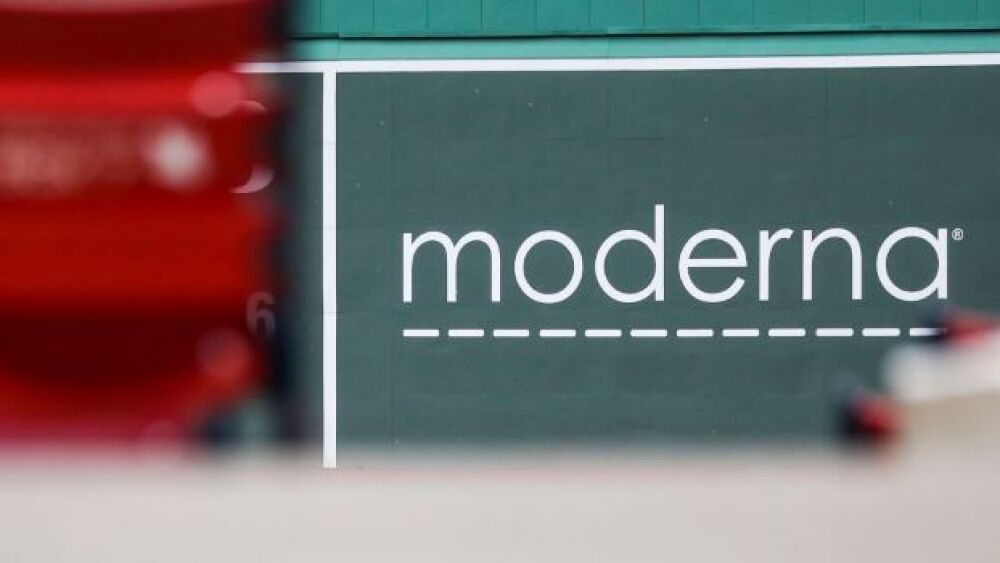Today, activists with the AIDS Healthcare Foundation are setting up to protest in front of Moderna’s Cambridge headquarters.
Adam Glanzman/Getty Images
Companies like Moderna, Pfizer and BioNTech are sitting scapegoats for the label “pandemic profiteering.” It is to be expected, and today, activists with the AIDS Healthcare Foundation (AHF) are setting up to protest in front of Moderna’s Cambridge headquarters. They are asking the drugmaker to step up in the area of social responsibility.
“Right now, we know that Moderna has the ability to share the vaccine recipe so that smaller countries can make the vaccine themselves, so they can supply it to their citizens. They’re choosing not to,” said Tracy Jones, the foundation’s national director of mobilization campaigns.
In October 2020, Moderna stated that for the duration of the COVID-19 pandemic, it would not enforce its COVID-19 related patents against those making vaccines intended to combat the crisis. The company further stated that, upon request, it would license its intellectual property to others during the post-pandemic period. Jones acknowledged this but said that Moderna needs to do more.
The organization sees an eerie parallel with the AIDS epidemic of the 1990s when Burroughs Wellcome, the developer of azidothymidine (AZT), an antiviral that changed the game against the disease, set a prohibitive price of $8000 for the drug. This made it difficult for uninsured patients – often at the highest risk of contracting AIDS – to afford it.
AHF Senior Director of Communications Ged Kenslea is concerned that history is repeating itself here. Kenslea said that “even a double-digit price tag for Moderna’s COVID-19 vaccine means that many developing countries will not be able to afford the shots.”
Moderna is reportedly charging $16.50 per dose in the U.S., while the price point is as high as $37 in other parts of the world. The company, which in May joined COVAX, the global vaccine initiative led by Gavi, the Coalition for Epidemic Preparedness Innovations (CEPI), and the World Health Organization (WHO), has promised to provide up to 500 million doses of the vaccine to the lowest income countries by the end of 2022 at the “lowest tiered price.” The delivery of 34 million doses is scheduled to begin in the fourth quarter of 2021.
Kenslea anticipates that this will not be enough, particularly as the virus can mutate into new variants of concern in under-vaccinated regions of the world.
“The focus is what we believe is pandemic profiteering, but we need to have great global awareness about the danger and the need around the world,” he said. “It will boomerang back. I don’t think the awareness of that is great, while we’re having pissing contests around whether or not to vaccinate or wear masks here.”
Moderna will not be alone in preparing for the protest today, as AHF plans to also make an appearance in front of Pfizer’s Cambridge office.
Pfizer Chief Executive Officer Albert Bourla has previously signaled his disagreement with the U.S. support for a COVID-19 IP waiver proposal placed in front of the WHO in May. At the time, Bourla said that the real problem was the lack of global manufacturing capacity for mRNA vaccines.
At the time, Moderna CEO Stéphane Bancel said, “I didn’t lose a minute of sleep over the news during the night.”
In a somewhat ironic parallel, BioSpace reported earlier this month that Moderna was preparing to launch clinical trials for an experimental mRNA-based vaccine against HIV. The company is hoping that the modifiable nature of mRNA will enable it to develop an effective vaccine for the virus, which has mutated into numerous variants since being discovered.
Moderna is seeking to enroll 56 people ages 18 to 50 who are HIV-negative. In this cyclical tale, the question could become whether pricing for a successful vaccine would follow the same schematic.






